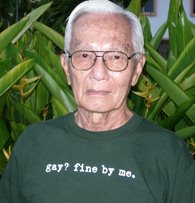
The following is a reproduction of an article from
www.fridae.com about same-sex attraction from a Christian's perspective. As mentioned in my previous Blog entry, the speaker is in my view an enlightened Christian who is at a better position to share God's love and reach out to homosexuals than intolerant and judgemental Christians who condemn them. I hope his message touches the hearts and minds of anyone out there reading this Blog. God Bless you.
---------------------------
December 20, 2005
Same-sex attraction: a Christian perspective
By Rev Dr Yap Kim Hao
Is it possible to be Christian and gay as many reject the premise that one can be both at the same time? Rev Dr Yap Kim Hao, the first Asian Bishop of The Methodist Church in Singapore, shares his beliefs and journey to affirming gay Christians.
The following is the transcript of Rev Dr Yap Kim Hao's talk organised by RedQuEEn! (http://www.geocities.com/red_qn), a queer women’s discussion group in Singapore, at the Substation on 23 July 2005.
The speaker Rev Dr Yap Kim Hao is one of few gay-affirming pastors in Singapore and serves in a voluntary capacity in the Free Community Church (http://freecomchurch.org) which counts many gays and lesbians as members. He has been a pastor of the Methodist churches in Malaysia and Singapore and served as its first Asian Bishop in 1968-73. He resigned from that position to become the General Secretary of the Christian Conference of Asia in 1973-85. It was there that he was directly involved in social justice issues and ministry to the oppressed and marginalised in the Asian region. He taught in Trinity Theological College and in Southern Methodist University in Dallas, Texas. The ministry to the LGBT Christian community is a natural extension of his calling to serve God.
Message from Rev Dr Yap Kim Hao:
The Christmas stories tell of the rejection of Jesus at the time of his birth. The Holy Family was found knocking at the doors of Bethlehem and was confronted with the "No Vacancy" sign for there was no room in the inn.
Legend suggests to us about the birth of the Christ Child in a lowly manger. He was marginalised there, yet there were those who accepted him. Three Wise Men travelled from afar to the place where he was and brought gifts. Simple shepherds left their flock by night and came to adore him.
For gay people you have, and continue to experience rejection and marginalisation and you find security in your manger. The Jesus whose birth is being celebrated knows your condition and shares your anxiety. He did not remain in Bethlehem. He came out into the world to face the opposition and made the difference in the lives of people.
Increasingly there are those who are on the journey to be gay-affirming and gay-friendly. Together we work to make our society more inclusive and celebrate the love that came down at Christmas. To my Christian friends – A Merry Christmas to You. To all the Peace of God be with you.
My Journey to Affirming the Gay Community
You have responded to the invitation of RedQuEEn! to this discussion on the specific topic of same-sex attraction. I have been challenged by the organisers (Su-Lin, Charmaine, Eileena) to give my private and personal perspective as a Christian. Given the fact that the majority of the Christian community is homophobic, I am heartened that there is an increasing number of Christians who are being enlightened and the day will soon dawn when the majority of Christians will be gay-affirming. This is a rising tide and it will flow on. Never before did I even dream that I will be called upon to speak in the Substation to an eager audience on this issue. God works in a mysterious way, with wonders to perform.
We want to be focused and respond to the objectives of this meeting. I have read through the questions that some of you have sent in. The process is for me first of all to share my views and then we will learn from one another through the more important session of Question & Answer. It is necessary for me to indicate to you where I come from or how I got this perspective which has yet to be accepted by the majority of the Christian community.
Like many people I am a creature of the history and culture into which I was born and nurtured. As individuals we respond in different ways and our attitudes and views vary. In my time and location the gay issue was not discussed openly. There was misinformation resulting in misunderstanding. Like most people I was silently homophobic then.
When I began my ministry in the mid-fifties, I was asked by a leading architect who must have been struggling with his sexual orientation about the views of the church. I had never studied the subject and just looked up the few isolated passages of the Bible and quickly concluded that the Bible is against homosexuality. In the minds of the Christian community until today it is not contestable for the literal words of the Bible tell me so. Homosexuality being a sin then becomes the only conclusion and is still believed by a majority of the Christian community.
Later, I met a gay person from a very rich family who wanted me to help his mother whom he had come out to, to understand the gay issue. He is a doctor trained in London. That was my first contact with a gay person and he later introduced me to his gay and lesbian friends here. He must have sensed that I could be sympathetic and took the risk. As a matter of fact I was very naïve about homosexuality. I even asked why he did not seek the best of psychiatric help to correct his condition. It was only later that I understood why he laughed at me and realised how ignorant I was about the subject. Soon I began my journey to affirming the gay community.
Sexual Orientation
I read that Sigmund Freud long ago attested that it is as difficult to change the orientation of a homosexual as it would be a heterosexual. He has been proven right. The condition comes, as does being heterosexual, by a combination of genetic, hormonal, and very early societal development. It is both nature and nurture. It is not a disease to be caught.
Freud was before his time on this issue. In 1973, the American Psychiatric Association removed homosexuality from its list of personality disorders as did two years later the American Psychological Association, indicating the naturalness of a homosexual orientation. In 1997, it passed a resolution declaring therapists in these groups who engaged in such conversion therapies to be following unethical and unhealthy practices.
The American Academy of Pediatrics, American Counselling Association, American Association of School Administrators, American Federation of Teachers, American Psychological Association, American School Health Association, Interfaith Alliance Foundation, National Association of School Psychologists, National Association of Social Workers and National Education Association in the United States developed and endorsed the following statement in 1999:
"The most important fact about 'reparative therapy' and also sometimes known as 'conversion therapy,' is that it is based on an understanding of homosexuality that has been rejected by all the major health and mental health professions. [Our organizations], together representing more than 477,000 health and mental health professionals, have all taken the position that homosexuality is not a mental disorder and thus there is no need for a 'cure’. ...health and mental health professional organizations do not support efforts to change young people's sexual orientation through 'reparative therapy' and have raised serious concerns about its potential to do harm."
Dr Robert Spitzer, professor of psychiatry at Columbia University announced a study indicating that "reparative" therapy has a failure rate on the order of 99.98 per cent. Indeed, the largest "reparative" therapy organisation, a ministry called Exodus International initiated and supports Choices here in Singapore. It was started by two formerly homosexual men who several years later ended up leaving the ministry, denouncing it, and living as a homosexual couple themselves.
With such official statements from reputable organisations, how can I as a simple layman not agree with these respectable scholars, teachers, social workers and doctors.
Religious Attitudes
Continuing my journey of discovery I find that the church like an ostrich has its head in the sand. Gays and lesbians are compelled to stay hidden in their closets when there is so much homophobia within the church and in the community. I kept quiet too but I saw that the movement was beginning to form in the West and I had expected it would take a long time to surface here in Asia, and especially in Singapore with its sanitised and conservative climate. But I was wrong and had little faith.
With women and blacks engaged in their liberation struggle it was a matter of time when the gay liberation would surface. My sympathies have always been for people who are victimised, the poor, and the handicapped. This was enhanced when I became a member of the handicapped community due to the physical assault I received from the hands of a group of drunken Japanese military police in 1945. I was just an innocent victim.
Then I went to the United States for my college education and I had to work my way to earn money beginning as a garbage collector in college, dishwasher, gardener and houseboy in a dormitory. Added on is the fact that I was with a handful of foreigners in a community of real heartlanders in the middle of the United States in the State of Kansas. It was the beginning of the Civil Rights struggle and I made friends with the African- Amercians and sensed in a personal way what racial discrimination is all about. The professors in my college and seminary had a strong social passion and supported the civil rights struggle.
For me it was a natural transition to the gay issue when it emerged here. It was just a concern for another marginalised and oppressed group of people. It was this sense of justice and fair-play which I was able to develop in my own intellectual and religious development that propelled me in my journey. My understanding of God is that God is the creator and we are loved by God. God created each one of us and we are formed by God. God affirms my identity including my sexual identity.
In trying to understand the question of same-sex attraction I can only naturally look at my own life and examine my sexual life. Did I at any time choose between heterosexuality and homosexuality? No, it just came naturally and it was not a matter of choice. Of course, I don’t experience how gays and lesbians become aware of same-sex attractions. I can only surmise that it came naturally to you too. I did not choose heterosexuality and you did not choose homosexuality.
The more I meet with gays and lesbians and the more I study the issue of homosexuality, the more I can affirm with conviction that homosexuality is not a sin. It is not a choice. I am convinced that the more heterosexuals meet gay people, the more they will realise that homosexuals are just as normal or abnormal as they are. The only difference is in their attraction – same-sex or opposite-sex.
Religions & Homosexuality
In my study I find that none of the major Chinese religions condemn homosexuality as a sin. The ancient Chinese believe man has the duty to produce children and maintain the family line. Sex outside of marriage and even with male lovers is viewed as a private matter. The purpose of sex is the procreation of children. It is also believed that sex strengthens male vitality by absorption of the female Yin essence which is the vaginal fluid. Same-sex acts do not diminish male vitality. This understanding prevails in Japan also.
Buddhism is traditionally neutral in its attitude towards homosexuality. It is not mentioned in any of Buddha’s discourses. Buddhist countries have few social and legal prohibitions against homosexuality. Thailand is relatively free from homophobia. Buddhism does not see homosexuality as wrong and heterosexuality as right. Both are sexual activity using the body and are strong expressions of lust which increase wrong desires. Buddhism does not condemn homosexuality as wrong and sinful. It does not condone it either, simply because it, like other forms of sex, delays the deliverance from samsara or re-incarnation.
Hinduism's stance of homosexuality is unclear for there is conflict in Hindu scriptures over this issue. None of the sacred Hindu text, such as the Vedas, contain condemnation of homosexuality. However, the Vedas does mention human beings as being classified into three different categories: male, female and a third sex. “Third sex” is the group most homosexuals identify themselves with. It is likely that homosexuality is not viewed as correct but tolerated. The Indian Kama Sutra written in the third century contains passages describing oral sex performed by men on men with tips to maximise pleasure. Prior to British colonisation of India, oral sex was not the only homosexual activity, many engaged in a form of pederasty which was openly practiced by Muslims and Sikhs in the north while being overlooked in the south by Hindus.
Ancient Greece and Rome accepted sexuality as a natural part of life, but it was more refined in Greek culture. Marriage was monogamous but sex was not confined within the marriage bond. Homosexuality was accepted because human nature is bisexual. Sexual polygamy existed within marital monogamy. The male-dominated society also had double standards. Brides were expected to be virgins but not bridegrooms. Wives did not have a public life and were confined to household duties. Men, on the other hand engaged in sex freely with slaves and prostitutes. Adultery was not proscribed except with another man’s wife who was regarded as a piece of property. Fidelity was required of wives. Along these lines, the philosophers discussed adult male relationships with boys and male youths known as pederasty. At best, adult males saw pederasty as being primarily a mentoring relationship.
When the Bible condemns the “homosexuality” of the Greco-Roman society, it was condemning all forms of ancient pederasty, not modern homosexuality. We would be violating the historical context of these texts if we failed to account with the truth that homosexuality in our historical context is different from that which occurred in the Greco-Roman world. Homosexuality today may be a sin in the eyes of some, but you cannot prove it by referring to biblical texts that are condemning pederasty and not homosexuality.
Terminology of Homosexuality
Homosexuality in terms of personal orientation as a life-long pattern was first used by Swiss doctor K M Benkert in 1869. Homosexuality refers to a sexual orientation characterised by aesthetic attraction, romantic love and sexual desire exclusively or almost exclusively for members of the same sex.
According to the most recent edition of Merriam-Webster's Collegiate Dictionary (tenth edition), "homosexual" as an adjective was first used in 1892 and as a noun in 1902, and "homophobia" was first used in 1969 and "homophobe" first used in 1975. The translation of any Bible word as “homosexual” is a mistake.
Homosexuality & Abrahamic Religions
Religion has played a significant role in forming a culture’s views towards homosexuality. There is cultural construction of the view of homosexuality. It is claimed to be religiously revealed in their sacred writings. Historically the negative perceptions have been limited to the Abrahamic religions. Other religious groups have commonly regarded homosexuality as sacred or neutral. In the wake of colonialism and Imperialism undertaken by countries of the Abrahamic faiths, some non-Abrahamic religious groups have adopted new attitudes which condemn homosexuality.
The world's three major Abrahamic religions – Christianity, Islam and Judaism have historically been the primary sources condemning homosexuality in the world.
Orthodox Jews believe that homosexual intercourse by men and women was sinful, since it is forbidden by the Torah. An interpretation of Leviticus 18:22 and 20:13 shows that homosexual intercourse between men is considered on the same level as idolatry; requiring death, and for women it is based on Leviticus 18:2-3, where the Israelites are commanded not to follow the ways of the Egyptians or Canaanites. Today some major denominations within these religions have accepted homosexuality, arguing that the Jewish law was originally intended to distinguish between Judaism and pagan faiths, and is thus no longer relevant.
Conservative Jews recognise equality of congregation members regardless of sexual orientation, favour decriminalisation of homosexual acts, prohibit discrimination against homosexuals, and supports equal rights for gays and lesbians.
Reform Judaism argues that homosexuality is a natural attraction, and that the prohibition in the Torah was addressing pagan religious rituals, specifically Egyptian and Canaanite fertility cults and temple prostitution. They accept gay and lesbian rabbis and support civil same-sex marriages.
In Islam, homosexuality is considered as sinful. Muslims believe that people are not homosexual by nature and they become homosexual because of their environment. There are five passages in the Koran which relate to gay and lesbian behaviour.
Biblical Interpretation
Those of you who are Christian claim that the churches teaching same-sex attraction is based on the Bible. So they lift up and quote certain chapters and verses from the Bible associated with this issue and regard them as divine truth revealed by God. The Bible is a difficult book written by inspired men and women of faith believing that it was revealed to them. At one time they even claim that it was dictated by God and they just recorded it. Soon it was realised that it was not dictation but interpretation of what they believed to be God’s revelation.
The early religious community had to determine whose writing should be included in the Bible and the Church in Council finally came in to sort out these religious documents and officially gave its approval to form what we now have as the Holy Bible.
The Church leaders continued to give their interpretation of what was interpreted in the first place by the writers of the different books of the Bible. Then as good Protestants we could not accept that and called for individual interpretations of the Bible. The Bible which was denied by the Roman Catholic Church was then made available to individual Christians for their reading, study and interpretation.
The interpretations of the Bible from the outset reflected also the historical and cultural situations which prevailed then and continue to do so in the work of those who study the Bible today. Our first task is to try to understand what is meant when it was written and how it relates to us in our contemporary setting.
When I first studied for the Christian ministry I was assigned a book to read which was influential in my understanding about the Bible and Biblical interpretation. The title of the book is The Bible Speaks to our Generation. I must add the Bible continues to speak to each succeeding generation and we need to re-examine our interpretation in every generation.
In Biblical times and in Jewish history we find that it was a patriarchal society in which men ruled. Men are the head of the household. Women are seen to be subordinate and therefore submissive to men. In fact, the wife of the man is his property and it was the religious duty of the women to be producing babies, taking care of the family, and satisfying the sexual needs of men. You will find a number of Biblical passages describing this role of women. Can you subscribe to this restrictive feminine role today?
This famous quotation from Greek writer Demosthenes makes it clear: "This is what it means to be married: to have sons one can introduce to the family and the neighbours, and to have daughters of one's own to give to husbands. For we have courtesans for pleasure, concubines to attend to our daily bodily needs, and wives to bear children legitimately and to be faithful wards of our homes."
Furthermore, the passages of same-sex acts must be seen in the light of the Jewish opposition to pagan religions. The Greek and Roman culture influenced those who wrote the New Testament and coloured their reactions to pagan temple prostitution and sexual acts.
Let us look at 1 Corinthians 6:9. The two Greek words malakoi and arsenokoitai have been translated differently at different times in different versions of the Bible in English. The King James Version in 1611 regarded them to mean those who are effeminate and abusers of themselves with mankind, which was close to the Greek meaning.
The original Revised Standard Version (the New Testament first appeared in 1946) was the first translation ever to use the word "homosexual.” It translated the two words to mean homosexuals or sexual perverts. Then in 1978 the New International Version translated them as male prostitutes and homosexual offenders. It was the New Revised Version in 1989 which renders them as male prostitutes and sodomites. It must be noted that the word homosexual was not used in the earlier period. It was in 1180 that the word sodomy was first used. There is no such word as "sodomite" in the original languages (Ezekiel 16:49-50 describes the sin of Sodom as pride, gluttony, not caring for the poor and needy).
Roman culture which expected people to engage in sex with both men and women. The majority of people, then as now, had a heterosexual orientation. Thus, to participate in same-sex behaviour, and to meet society's expectations, they would have had to disregard their sexual orientation. They would have gone beyond their own nature. "The resulting activity was "unseemly" and an "error" only because the men were heterosexual by orientation. Again, it was their attempt to violate their own nature, that is, their attempt to alter the orientation God created them with, that Paul was addressing... The bottom line is, God created each of us with a sexual orientation. To attempt to change it is, in effect, telling God that He created us wrong. The creation (us) does not have the right to "re-create" itself."
The situation to the ancient Romans is similar to the situation that homosexuals find themselves in today: society expects them to be heterosexual, and to engage in sexual activity with persons of the opposite gender -- even to marry. And so, many gays and lesbians go against their nature and try to pretend to be heterosexual.
The NGPA also notes that Paul referred to this as an "error”: a mistake, not a sin.
Seow Choon Leong of Princeton Theological Seminary: "I used to believe that divorce is wrong under any circumstance, simply because that is what the scriptures teach. I could -- and still can -- quote chapter and verse from the Bible (Matthew 5:31), particularly the words of Jesus. I have since learned from friends and loved ones what horrible traps bad marriages can be. People suffer enormously; some people even kill themselves because of bad marriages that they cannot otherwise escape. Some people suffer physical abuse in such marriages. Some are even killed. Unlike the friends of Job, I am not willing to uphold dogma at all costs, certainly not when I know that people are suffering and dying. I have gone back to reread the scriptures and I have heard the gospel anew.
“I also used to believe that homosexual acts are always wrong. Listening to gay and lesbian students and friends, however, I have had to rethink my position and reread the scriptures. Seeing how gay and lesbian people suffer discrimination, face the rejection of family and friends, risk losing their jobs, and live in fear of being humiliated and bashed, I cannot see how anyone would prefer to live that way. I do not understand it all, but I am persuaded that it is not a matter of choice. Seeing how some gay and lesbian couples relate to one another in loving partnerships, observing how much joy they find in one another, and seeing that some of them are better parents than most of us will ever be, I have reconsidered my views. I was wrong.
From the testimony of homosexual persons and from various reports, I have learned that there is an extraordinarily high rate of suicide among homosexual persons. People are dying every day because of society's attitudes -- indeed, because of the church's stance. Many people hate themselves because of what society and the church say about them. I know of many homosexual persons in the ministry who have been very effective for the cause of Jesus Christ, but they suffer tremendous guilt because they have to keep their secret from the church they love dearly.... They are hurt by the church. I cannot believe that we are called to perpetuate such pain and suffering in the world.... For me there is nothing less than the gospel at stake."
Concluding Remarks
All the religious, historical, social and cultural factors must be taken into account into reading and interpreting specifically the few Biblical texts regarded to be related to the issue of same-sex attraction. Just to quote the words of the Bible without looking at the context and the traditions related to them is just not enough and irresponsible.
Then we have to examine our contemporary understanding of ourselves and our community. We are sexual beings with our urges, drives, desires and attractions.
As a heterosexual, I just accept my condition and I don’t question it. I was made that way in being attracted to the opposite sex. Since the majority of God’s people are heterosexual this powerful majority became regarded as normal. They view those who are different from them as abnormal or deviant. Those whom God has endowed with same-sex attractions are forced to question themselves. Is this normal? Is this acceptable to God? You know that you cannot change your sexual orientation and we as heterosexuals know too well that we have no desire to become homosexual. We have to relate to our different sexualities as given by God and we cannot fully comprehend the purposes of God in ordering different sexual conditions.
Especially within the Jewish/ Christian/ Muslim religious and cultural traditions we have changing attitudes towards sex. It is made more difficult when we view the spirit or soul as spiritual, and matter and body as material, and we place a higher value on things of the spirit and tend to despise the material body. We tend to believe that God is only spiritual, dwelling in the heavenly realm and totally unrelated to the material and earthly plane. Consequently we regard sex as evil and celebrate the virtue of celibacy and the denial of all things sexual. Who dares to say anything about Jesus’ being? He comes through as divine and therefore assumed to be sexless. Such is not the case of our friend Paul the Apostle who recognised the flaming power of sex though he did not give room to express it himself.
The Early Church Fathers viewed sexuality as a result of the Fall of Adam. The highest virtue for the Christian is that of martyrdom followed by virginity and celibacy. The lowest rung is the state of marriage. Sex is seen as a danger to Christian piety. Sexual abstinence in marriage is better than that of procreating children. The least good is that of enjoying sex. St. Augustine was troubled about sexual lusts and linked all sexual union with original sin. Later St Aquinas judged sexual acts in this manner: “They must be done for the right purpose (procreation), with the right person (one’s lawfully wedded spouse), and in the right way (heterosexual genital intercourse).”
Now there is general recognition that sex is not only for procreation. In Biblical times we have injunctions about semen, masturbation and attitudes about menstruation relating to procreation. This was modified by the Catholic Church with regard to family planning and population control. The Protestant churches generally have no problems with the use of condoms to prevent conception and with the issue of abortion.
Today there is also increasing acceptance of sex as described by James Nelson: God’s primary purpose in creating us as sexual beings is not that of procreation, but rather to give us the desire and capacity to love and to bond with others in intimacy. Thus, theology has given new attention to the insight that sexuality is crucial to God’s design that creatures do not dwell in isolation and loneliness but in communion and community.
God’s fundamental purpose in creating us as sexual beings was not that we might make babies, but that we might make love. I believe as sexual beings we are concerned with love, intimacy, mutuality, sexuality. Sexual intercourse is exploitative when it is not mutually satisfying or an expression of intimacy and love for one another.
John Boswell in his historical studies revealed that the Early Church did not generally oppose homosexual behaviour as such. The opposition that arose during the third to sixth centuries was due to the demise of urban culture, government regulation on personal morality and church pressures toward asceticism. Hostility appeared only in the late twelfth century.
Marriage was not celebrated by Christian wedding services in church worship until perhaps the ninth century. It was considered as a civil order and not a religious rite or church ceremony before that.
Today, I regard mutuality, intimacy, life-long committed relationships, and sexual pleasure as important values for marital relationships for heterosexuals as well as homosexuals.
What I have done in this presentation is to share with you the background of my perspective on same-sex attraction. We may not have the time to go into greater detail the different interpretations of the particular passages of the Bible which you have so much trouble with. I have outlined the way in which we should approach them. Maybe RedQuEEn! can structure some study sessions to further clarify them and help you to come to the realisation that same-sex attraction is not a sin but an orientation, holy and acceptable in the sight of God























